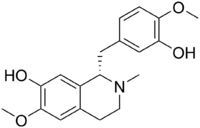Reticuline
| Reticuline | |
|---|---|
 | |
| IUPAC name (1S)-1-[(3-Hydroxy-4-methoxyphenyl)methyl]-6-methoxy-2-methyl-3,4-dihydro-1H-isoquinolin-7-ol | |
| Identifiers | |
| CAS number | 485-19-8 |
| PubChem | 439653 |
| ChemSpider | 388724 |
| ChEMBL | CHEMBL401501 |
| Jmol-3D images | {{#if:CN1CCC2=CC(=C(C=C2[C@@H]1CC3=CC(=C(C=C3)OC)O)O)OC|Image 1 |
| |
| |
| Properties | |
| Molecular formula | C19H23NO4 |
| Molar mass | 329.39 g mol−1 |
| Except where noted otherwise, data are given for materials in their standard state (at 25 °C (77 °F), 100 kPa) | |
| Infobox references | |
Reticuline is a chemical compound found in a variety of plants including Lindera aggregata,[1] Annona squamosa,[2] and Ocotea fasciculata (also known as Ocotea duckei).[3]
Reticuline is one of the alkaloids found in opium, and experiments in rodents suggest it possesses potent central nervous system depressing effects.[3]
Metabolism
3'-hydroxy-N-methyl-(S)-coclaurine 4'-O-methyltransferase uses S-adenosyl methionine and 3'-hydroxy-N-methyl-(S)-coclaurine to produce S-adenosylhomocysteine and (S)-reticuline.
Reticuline oxidase uses (S)-reticuline and O2 to produce (S)-scoulerine and H2O2.
Salutaridine synthase uses (R)-reticuline, NADPH, H+, and O2 to produce salutaridine, NADP+, and H2O.
1,2-dehydroreticulinium reductase (NADPH) uses (R)-reticuline and NADP+ to produce 1,2-dehydroreticulinium, NADPH, and H+.
References
- ↑ Han, Zheng; Zheng, Yunliang; Chen, Na; Luan, Lianjun; Zhou, Changxin; Gan, Lishe; Wu, Yongjiang (2008). "Simultaneous determination of four alkaloids in Lindera aggregata by ultra-high-pressure liquid chromatography–tandem mass spectrometry". Journal of Chromatography A 1212 (1–2): 76–81. doi:10.1016/j.chroma.2008.10.017. PMID 18951552.
- ↑ Dholvitayakhun, Achara; Trachoo, Nathanon; Sakee, Uthai et al. (2013). "Potential applications for Annona squamosa leaf extract in the treatment and prevention of foodborne bacterial disease". Natural Product Communications 8 (3): 385–388. PMID 23678817.
- ↑ 3.0 3.1 de Morais, Liana Clébia Soares Lima; Barbosa-Filho, José Maria; de Almeida, Reinaldo Nóbrega (1998). "Central depressant effects of reticuline extracted from Ocotea duckei in rats and mice". Journal of Ethnopharmacology 62 (1): 57–61. doi:10.1016/S0378-8741(98)00044-0. PMID 9720612.
| |||||||||||||||||||||||||||||